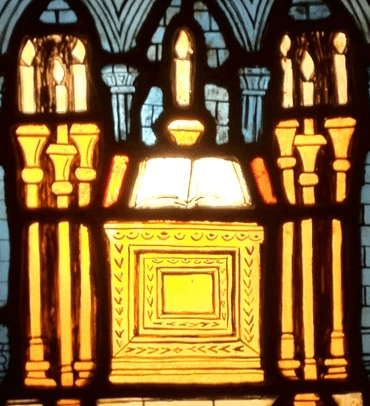1
A ovo su imena plemenima. Od kraja prema severu, uz put etlonski kako se ide u Emat i Asarenan, na među damaštansku na sever pokraj Emata, od istočne strane do zapadne, Danovo, jedno.
2
A uz među Danovu, od istočne strane do zapadne, Asirovo, jedno.
3
A uz među Asirovu, od istočne strane do zapadne, Neftalimovo, jedno.
4
A uz među Neftalimovu, od istočne strane do zapadne, Manasijino, jedno.
5
A uz među Manasijinu, od istočne strane do zapadne, Jefremovo, jedno.
6
A uz među Jefremovu, od istočne strane do zapadne, Ruvimovo, jedno.
7
A uz među Ruvimovu, od istočne strane do zapadne, Judino, jedno.
8
A uz među Judinu, od istočne strane do zapadne, neka bude prinos što ćete prineti, dvadeset i pet hiljada lakata u širinu, a u dužinu kao koji drugi deo, od istočne strane do zapadne, i svetinja da bude usred njega.
9
Prinos koji ćete prineti Gospodu, neka bude od dvadeset i pet hiljada lakata u dužinu i od deset hiljada u širinu.
10
I taj će sveti prinos biti sveštenicima, sa severa dvadeset i pet hiljada lakata u dužinu, a sa zapada deset hiljada u širinu, i s istoka deset hiljada u širinu, a s juga dvadeset i pet hiljada u dužinu; i svetinja Gospodnja da bude usred njega.
11
To će biti sveštenicima posvećenim između sinova Sadokovih koji držaše šta sam naredio da se drži i ne zađoše kao drugi Leviti, kad zađoše sinovi Izrailjevi.
12
Njihov će biti sveti prinos od zemlje, svetinja nad svetinjama, uz međe levitske.
13
A Leviti da imaju uz međe svešteničke dvadeset i pet hiljada lakata u dužinu, i deset hiljada u širinu; sva dužina da bude dvadeset i pet hiljada, a širina deset hiljada.
14
A od toga ništa da ne prodaju ni promenjuju, ni da prenose prvina zemaljskih, jer je svetinja Gospodu.
15
A pet hiljada lakata što ostaje u širinu prema dvadeset i pet hiljada biće mesto posvećeno, za grad, za naselje, i za podgrađa, i grad da bude usred njega.
16
A ovo da mu je mera: sa severne strane četiri hiljada i pet stotina lakata, i s južne strane četiri hiljada i pet stotina, i s istočne strane četiri hiljada i pet stotina, i sa zapadne strane četiri hiljada i pet stotina.
17
I podgrađe će biti dvesta i pedeset lakata sa severa, i dvesta i pedeset s juga, i dvesta i pedeset s istoka, i dvesta i pedeset sa zapada.
18
A šta ostane u dužinu prema svetom prinosu, deset hiljada lakata na istok i deset hiljada na zapad, prema svetom prinosu, od toga dohodak neka bude hrana slugama gradskim.
19
A sluge koje će služiti gradu biće iz svih plemena Izrailjevih.
20
Sav ovaj prinos, dvadeset i pet hiljada lakata uz dvadeset i pet hiljada, četvrtast, prineće u prinos sveti za dostojanje gradu.
21
A šta ostane s obe strane svetom prinosu i dostojanju gradskom, prema dvadeset i pet hiljada lakata prinosa do međe istočne, i sa zapada prema dvadeset i pet hiljada lakata duž zapadne međe prema delovima, to da je kneževo; tako će sveti prinos i svetinja doma biti u sredi.
22
A od dostojanja levitskog i od dostojanja gradskog, usred onog što je kneževo, između međe Judine i međe Venijaminove, da je kneževo.
23
A ostala plemena biće: od istočne strane do zapadne strane Venijaminovo, jedno;
24
A uz među Venijaminovu, od istočne strane do zapadne, Simeunovo, jedno;
25
A uz među Simeunovu, od istočne strane do zapadne, Isaharovo, jedno;
26
A uz među Isaharovu, od istočne strane do zapadne, Zavulonovo, jedno;
27
A uz među Zavulonovu, od istočne strane do zapadne, Gadovo, jedno;
28
A uz među Gadovu s južne strane, na jug, međa je od Tamara do vode Merive u Kadisu, duž potoka do velikog mora.
29
To je zemlja koju ćete žrebom razdeliti plemenima Izrailjevim u nasledstvo, i to su im delovi, govori Gospod Gospod.
30
A ovo su krajevi gradu: sa severne strane četiri hiljada i pet stotina lakata da bude mera;
31
A vrata gradska da se nazovu imenima plemena Izrailjevih, troja vrata sa severa: jedna vrata Ruvimova, jedna vrata Judina, jedna vrata Levijeva;
32
I s istočne strane četiri hiljada i pet stotina lakata, i troja vrata: jedna vrata Josifova, jedna vrata Venijaminova, jedna vrata Danova;
33
I s južne strane četiri hiljada i pet stotina lakata da bude mera, i troja vrata: jedna vrata Simeunova, jedna vrata Isaharova, jedna vrata Zavulonova;
34
Sa zapadne strane četiri hiljada i pet stotina lakata, i troja vrata: jedna vrata Gadova, jedna vrata Asirova, jedna vrata Neftalimova.
35
Unaokolo će biti osamnaest hiljada lakata, a ime će gradu od tog dana biti: Gospod je tu.







